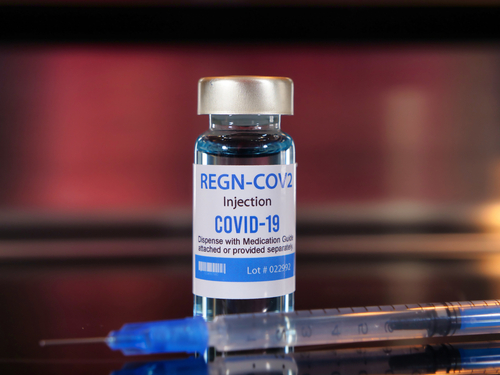
The U.S. Department of Health and Human Services announced plans to allocate initial doses of Regeneron’s COVID-19 antibody therapeutic, casirivimab and imdevimab.
The treatments received emergency use authorization from the U.S. Food and Drug Administration on Nov. 21 for treatment of non-hospitalized patients with mild or moderate confirmed cases of COVID-19 at high risk of hospitalization. The federal government announced federal funding in July to support the manufacturing of approximately 300,000 doses of casirivimab and imdevimab. HHS will allocate these government-owned doses to state and territorial health departments, which, in turn, will determine which healthcare facilities receive the drug.
“Authorization and distribution of this new Regeneron antibody treatment is another significant step forward in treating patients and bridging us to the rollout of safe and effective vaccines, with all of these efforts made possible by Operation Warp Speed,” HHS Secretary Alex Azar said. “Federal allocation of therapeutics like Regeneron’s, in cooperation with our state and local government partners, will help ensure that they go to the patients who need them the most, just days after the product is authorized.”
A data-driven system will ensure the continued fair and equitable distribution of these new products. Weekly allocations to state and territorial health departments will be proportionally based on confirmed COVID-19 cases in each state and territory over the previous seven days.
“We are committed to the equitable and efficient distribution of resources like casirivimab and imdevimab to help prevent hospitalization from COVID-19 as much as possible,” HHS Assistant Secretary for Preparedness and Response Robert Kadlec said. “To that end, we are coordinating with Regeneron, its distributor, and state and territorial health departments to get therapeutics into the hands of healthcare providers quickly, with a focus on areas of the country currently hardest hit by the pandemic.”
To accommodate the intravenous administration of therapeutics to non-hospitalized patients with mild to moderate COVID-19, outpatient facilities must have appropriate healthcare staffing, training, and equipment. Thus, additional preparation time may be required for some facilities before administering the drug to patients. The infusion process takes approximately one hour and may be followed by an observation period. Possible locations include hospital outpatient facilities, hospital emergency departments, and alternate care sites set up by hospitals and health departments. The government-owned doses will be available at no cost to patients, although healthcare facilities could charge for administering the medicine – as is customary with such government-purchased products.
“We have worked with state and territory partners to refine the process based on experience with previous therapeutics and diagnostics and now expect that after pulling this weekly data, shipments can be on their way within hours,” Kadlec added.
Regeneron developed casirivimab and imdevimab with preclinical and clinical development support through a flexible agreement with the Biomedical Advanced Research and Development Authority (BARDA), part of the HHS Office of the Assistant Secretary for Preparedness and Response. Regeneron used the same technology platforms and approach to develop an antibody treatment for Ebola that is now under regulatory review by the FDA.




